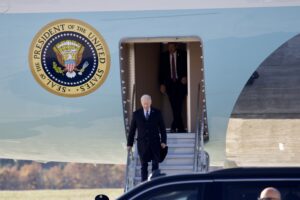Following the sweeping Super Tuesday presidential primary elections in the United States, President Joe Biden and Donald Trump officially secured their respective party nominations on March 12, 2024. The resulting rematch between Biden and Trump in their race to the Oval Office confirmed widespread anticipation of the candidates’ projected landslide victories in the primaries, setting the stage for the upcoming Nov. 5 election.
Nationally, Biden earned 2,099 delegates, exceeding the 1,968 threshold requirement to become the Democratic nominee, while Trump secured 1,228 delegates to successfully secure the GOP platform.
“We face a sobering reality,” said Biden in a statement after winning the Democratic nomination. “Freedom and democracy are at risk here at home in a way they have not been since the Civil War. Donald Trump is running a campaign of resentment, revenge and retribution that threatens the very idea of America. I believe that the American people will choose to keep us moving into the future.”
Celebrating his GOP victory, Former President Trump referred to Super Tuesday as “a great day of victory.”
“Now we have to get back to work because we have the worst president in the history of the
Country,” Trump said in a speech. “We’re not going to take time to celebrate. We’ll celebrate in eight months when the election is over. November 5, I believe, will go down as the most important day in the history of our country.”
Maine, a swing state, is among the 16 states and one U.S. territory that conducted presidential primary elections on March 12. Trump won the state Republican primary with 78,493 votes and received 20 delegates from Maine. Accordingly, Biden advanced in the state’s Democratic primary after securing 60,018 votes and 24 delegates.
Maine conducted semi-open primaries for the first time in state history, allowing voters unregistered as Democrats or Republicans to cast ballots in either party’s nomination race. Registered Maine Independents were able to participate in the party primary of their choosing.
UMaine Professor and Chair of the Political Science Department Mark Brewer reflected that local turnout levels were lower for both political parties due to the uncompetitive nature of the 2024 primary platform, which inevitably allowed Biden and Trump to ascend toward their party’s nomination as presidential incumbents without facing statistically significant challenges from opponents within their respective parties.
“Non-competitive races in both parties tend to drive turnout down nation-wide,” Brewer said. The future feasibility of Maine adopting completely open primaries, allowing voters unaffiliated with the Republican and Democratic parties to still select a candidate of their choice in either party’s nomination races is a considerable option.
“Maine has a history of innovation. Maine is the first in the modern era to divide its electoral college votes. Maine was the first state to adopt ranked-choice voting. You could easily see Maine completely open primaries,” said Brewer. “The parties will hate that, but it’s certainly a possibility.”
With seven months to spare until the November presidential election, Brewer is optimistic that Maine will retain its consistently high local participation levels.
“Maine is always top five in nation-wide voter turnout by state. 2024 overall is going to result in relatively high levels,” Brewer said. “Even if they don’t like either candidate–they’re going to dislike one more than the other. It may be a case of voting for the one you dislike the least. It’ll be a lesser of two evils kind of election.”
Brewer referred to lower turnout levels among 18 to 24-year-old eligible voters, stating “I’m more worried in this election cycle because there are a lot of college students in particular who are alienated by both candidates.”
“This is a high-stakes election. In this particular instance, you can envision a dramatically different next four years depending on who wins that presidential race,” Brewer added after expressing concern at the possibility of young progressives refraining from voting due to dissatisfaction or unenthusiasm for either candidate on the presidential ballot.
As political scientist James E. Campbell articulated in “Polarized,” his recently released book, “A voter cannot determine the election’s outcome any more than a single soldier can determine a war’s outcome or a single contribution to a charity can help cure a disease.” However, by casting a single ballot, each U.S. citizen solidifies the fundamental principle of free and fair elections, a cornerstone of democratic governments.
The framers of the American Constitution envisioned that U.S. citizens would exercise voting as a matter of civic duty, regardless of their political preferences. Eligible Maine residents, regardless of party affiliation, on the Orono campus and throughout the state can register to vote here or at their nearest poll on or prior to Nov. 5 election day, to select their preferred presidential candidate.










